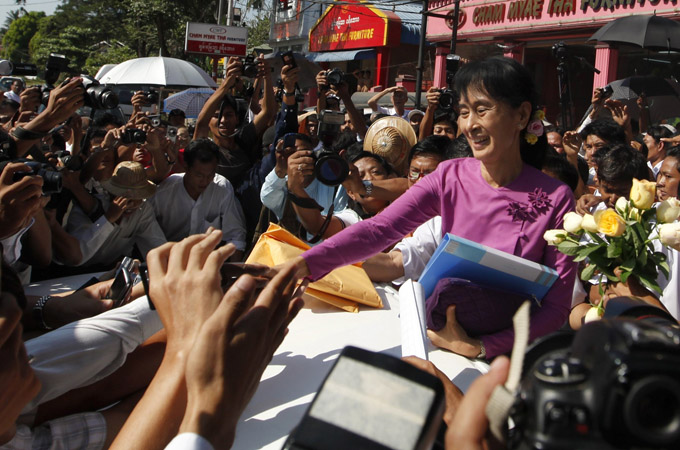Myanmar’s Suu Kyi registers for April vote
Nobel Peace Prize winner submits application to stand as Yangon candidate in parliamentary by-elections.

 |
| The NLD’s central committee voted to register the party, which was dissolved last year by the government [Reuters] |
Myanmar opposition leader Aung San Suu Kyi launched her historic bid for a seat in parliament in the latest sign of change in the country after the end of decades of outright military rule.
Throngs of flag-waving supporters crowded the local election office on Wednesday to shout support and catch a glimpse of the 66-year-old Nobel Peace laureate, who became Myanmar’s most recognizable face during years of house arrest under authoritarian rule.
The scene would have been unthinkable while the country was still under military rule. Suu Kyi was despised by the junta because of her popularity and any public support for her was swiftly and firmly halted.
The freedom allowed to Suu Kyi’s supporters is another sign that the country’s newly elected but military-backed government is following through on promises for democratic reforms, a key condition of the West before lifting sanctions.
Election boycott
Suu Kyi, who was released from years of house arrest in late 2010, submitted her registration form to election authorities to stand in Kawhmu, a rural constituency southwest of Yangon.
Her party, the National League for Democracy (NLD), has already been given approval to return to the official political arena, against a backdrop of reforms under the country’s nominally civilian government.
The NLD was stripped of its status as a legal political party in 2010 after it chose to boycott a controversial national election held in November of that year, saying the rules were unfair.
The 2010 vote, in which the military’s allies claimed an overwhelming victory, was marred by complaints of cheating and criticised by Western nations which enforced sanctions against the regime.
Political reforms
A quarter of parliament’s seats are taken up by unelected military officials while the Union Solidarity and Development Party, which is packed with former military men, holds about 80 per cent of the remainder.
Suu Kyi was released a few days after the 2010 poll, having spent much of the past two decades in detention.
Since coming to power in March, the new military-backed government, dominated by former generals, has made a series of reformist moves in an apparent attempt to reach out to political opponents and the West.
These included releasing hundreds of political prisoners, holding dialogue with the opposition, suspending construction of an unpopular “mega-dam” and pursuing peace deals with armed ethnic minority rebels.
The NLD won an election in 1990 by a landslide, while Suu Kyi remained under house arrest, but the ruling generals never allowed the party to take power.
A total of 48 seats are up for grabs in the April vote, not enough to threaten the resounding majority held by the ruling party.
The polls are to fill places vacated by those elected in the 2010 polls who have since become ministers and deputy ministers in the government.